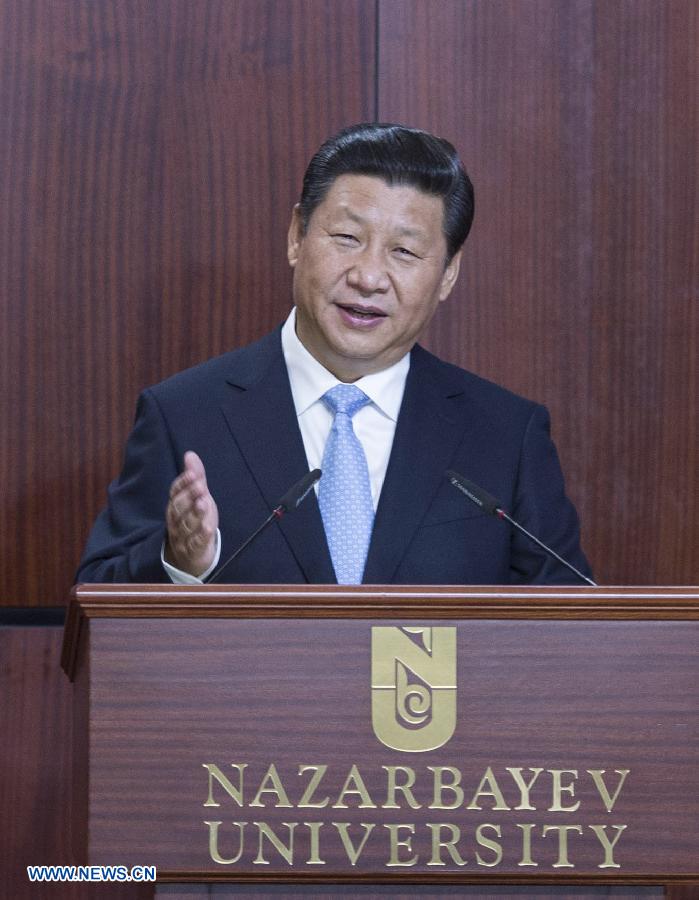 |
| Chinese President Xi Jinping delivers a speech at the Nazarbayev University in Astana, Kazakhstan, Sept. 7, 2013. (Xinhua/Wang Ye) |
ASTANA, Sept. 7 (Xinhua) -- Chinese President Xi Jinping proposed here Saturday that China and Central Asia join hands to build a Silk Road economic belt to boost cooperation.
In a speech delivered at Nazarbayev University, Xi suggested that relevant countries enhance communication and green-light regional economic integration in terms of both policy and law.
He proposed that China and Central Asian countries compare notes on their respective economic development strategy and work together to formulate plans and measures for regional cooperation.
Xi also said that they should work to improve traffic connectivity so as to open the strategic regional thoroughfare from the Pacific Ocean to the Baltic Sea, and gradually move toward the set-up of a network of transportation that connects Eastern, Western and Southern Asia.
On the topic of trade, Xi said all parties should explore ways to facilitate trade and investment, and make proper arrangements.
The Chinese president also urged the regional members to promote local-currency settlement so as to improve their immunity to financial risks and their global competitiveness.
Calling for strengthening friendly people-to-people exchanges, Xi proposed that mutual understanding and traditional friendship be promoted among the countries in the region.
The Silk Road boasts a 3-billion population and a market that is unparalleled both in scale and potential, said Xi, urging relevant parties to facilitate trade and investment and remove barriers.
The Chinese president also said that China respects the development paths and policies chosen by the peoples of regional countries, and will never interfere in the domestic affairs of Central Asian nations.
China will never seek a dominant role in regional affairs, nor try to nurture a sphere of influence, he added, saying that China and Central Asian nations should be genuine friends of mutual support and trust.
He also called on all sides to support each other on issues concerning sovereignty, territorial integrity, security and other core interests, and jointly crack down on the "three evil forces" of terrorism, extremism and separatism, as well as drug-trafficking and transnational organized crimes.
While answering a student's question on environmental protection during the Q&A session, the Chinese president said China shall always highlight the importance of environmental conservation, and will not seek economic progress at the cost of destroying the environment.
Kazakh President Nursultan Nazarbayev, who accompanied Xi to the university, told the audience in his remarks that Kazakhstan and China are good neighbors, friends and partners.
He believed that Xi's visit will greatly promote bilateral cooperation of mutual benefit and will take Kazakhstan-China comprehensive strategic partnership to new levels.
Nazarbayev also agreed with Xi on building the Silk Road economic belt, and would like to work with China to enhance economic cooperation, traffic connectivity, as well as people-to-people and cultural exchanges.
President Xi arrived in Astana on Friday for a state visit to Kazakhstan after attending a Group of 20 (G20) summit in the Russian city of St. Petersburg.
After his Kazakhstan trip, Xi is also scheduled to pay state visits to Uzbekistan and Kyrgyzstan. Before the G20 summit, he visited Turkmenistan.
He will attend the 13th meeting of the Council of Heads of Member States of the Shanghai Cooperation Organization in Kyrgyzstan.
Day|Week|Month